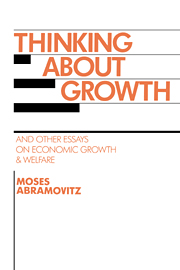Book contents
- Frontmatter
- Contents
- Editors' preface
- Preface
- Part I Growth and the economists
- Part II Studies in long-term growth
- 3 Resource and output trends in the United States since 1870
- 4 Economic growth in the United States: a review article
- 5 Manpower, capital, and technology
- 6 Rapid growth potential and its realization: the experience of capitalist economies in the postwar period
- 7 Catching up, forging ahead, and falling behind
- Part III Long swings in economic growth
- Part IV Growth and welfare
7 - Catching up, forging ahead, and falling behind
Published online by Cambridge University Press: 22 March 2010
- Frontmatter
- Contents
- Editors' preface
- Preface
- Part I Growth and the economists
- Part II Studies in long-term growth
- 3 Resource and output trends in the United States since 1870
- 4 Economic growth in the United States: a review article
- 5 Manpower, capital, and technology
- 6 Rapid growth potential and its realization: the experience of capitalist economies in the postwar period
- 7 Catching up, forging ahead, and falling behind
- Part III Long swings in economic growth
- Part IV Growth and welfare
Summary
Among the many explanations of the surge of productivity growth during the quarter century following World War II, the most prominent is the hypothesis that the countries of the industrialized “West” were able to bring into production a large backlog of unexploited technology. The principal part of this backlog is deemed to have consisted of methods of production and of industrial and commercial organization already in use in the United States at the end of the war, but not yet employed in the other countries of the West. In this hypothesis, the United States is viewed as the “leader,” the other countries as “followers” who had the opportunity to catch up. In conformity with this view, a waning of the opportunity for catching up is frequently advanced as an explanation of the retardation in productivity growth suffered by the same group of followers since 1973. Needless to say, the size of the initial backlog and its subsequent reduction are rarely offered as sole explanations of the speedup and slowdown, but they stand as important parts of the story.
These views about postwar following and catching up suggest a more general hypothesis that the productivity levels of countries tend to converge. And this in turn brings to mind old questions about the emergence of new leaders and the historical and theoretical puzzles that shifts in leadership and relative standing present – matters that in some respects fit only awkwardly with the convergence hypothesis.
- Type
- Chapter
- Information
- Thinking about GrowthAnd Other Essays on Economic Growth and Welfare, pp. 220 - 242Publisher: Cambridge University PressPrint publication year: 1989
- 6
- Cited by

